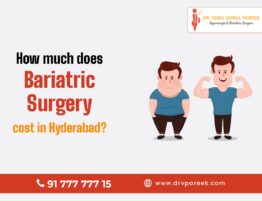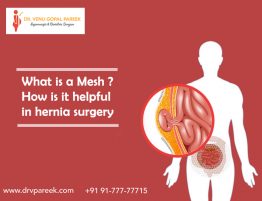
Digested food particles pass through the intestine for at least 10 meters (25 feet) as part of healthy digestion. This digested waste continues to move. But intestinal obstruction can stop it. Bowel obstruction occurs when your small or large intestine is blocked either partially or fully, preventing the passage of fluids and digestive nutrients.
When intestinal obstruction occurs, food, fluid, stomach acid, and gas accumulate behind the site of obstruction. When enough pressure builds up, your intestines can rupture and damage the intestines and bacteria in the stomach cavity. It is a life-threatening complication.
There are many possible causes of intestinal obstruction. Often this condition cannot be prevented. Early diagnosis and treatment are essential. Untreated intestinal obstruction can be fatal.
These articles provided by Dr. Venu Gopal Pareek gives you the information about intestinal obstruction, causes, symptoms, diagnosis, and treatment options available for treating intestinal obstruction. Go through the blog, and if you have any questions related to contact at 91-777-77715.
What Is An Intestinal Obstruction?

Bowel obstruction is a potentially dangerous condition in which the intestine gets blocked. A blockage may be partial or complete and occur in one or more locations. Both the small intestine and large intestine, which are referred to as colon, can be affected. When the blockage occurs, eating and drinking cannot pass the intestinal transit. The obstacles are severe and must be overcome immediately. A surgery might be needed.
What Causes Intestinal Obstruction?

There are several causes of intestinal obstruction. They can be:
- Scar tissue in the abdomen
- Twisting of the intestines
- Swallowed objects
Sometimes there may be no real obstruction, but intestines behave as something is blocked. It is called pseudo-obstruction. Possible causes include:
- Infections
- Nervous system disorders
Blockage in the intestine may be an emergency, especially if the bowels are twisted, as this can disrupt the blood supply and cause partial intestinal death. Dehydration can also be a dangerous complication that causes organ failure, shock, and death.
Mechanical Obstructions:

This happens when something physically blocks the small intestine. It could be for the following reasons:
- Adhesion: Fibrous tissue that develops after stomach surgery
- Intussusception: one part of the gut enters next part
- Hernia: The natural orifices of the body that enlarge and block part of intestines.
- Volvulus: Twisting of the intestine
- Tumor in the small intestine
- Gallstones that can – but rarely cause obstacles
- Intestinal malformations in newborns
- Ingestion of objects, especially in children
- Inflammatory bowel disease such as Crohn’s disease
Although rare, a mechanical obstruction can also block the large intestine. It could be for the following reasons:
- Colon cancer
- Impacted stool
- Diverticulitis: Inflammation or infection of the bulging pouch
- Meconium plugin newborns
- Volvulus and intussusception
- Stricture: Narrowing of the large intestine due to scarring or inflammation
Non-mechanical obstruction
Non-mechanical obstruction can occur when muscles or nerves damage the small or large intestine. This process is called paralytic ileus. It is known as a pseudo intestinal obstruction when it becomes chronic. The intestine usually works in a coordinated movement system. If something interferes with this coordinated contraction, it can cause functional bowel obstruction.
Causes for paralytic ileus include

- Abdominal or pelvic surgery
- Infections, such as gastroenteritis or appendicitis
- Some medications, including opioid pain medications, antidepressants, and antimuscarinics
- Low potassium levels
- Mineral and electrolyte disturbances
Bowel pseudo-obstruction can be caused by:
- Parkinson’s disease and other nerve and muscle disorders
- Hirschsprung’s disease, namely the lack of nerves in the intestine in newborns
- Other complications related to neuromuscular
- Complications that cause neuropathy, such as diabetes mellitus
Symptoms Of Intestinal Obstruction:

Unfortunately, signs of intestinal obstruction often occur in various problems. It takes time and tests to determine whether there is intestinal obstruction. Symptoms can include:
- Severe stomach pain
- Cramps that come in waves
- Bloating
- Nausea and vomiting
- Constipation, or inability to have a bowel movement
- Failure to pass gas
- Distention or swelling of the abdomen
- Loud noises from the stomach
- Foul breath
How To Diagnose Intestinal Obstruction:

First, the doctor can press on your stomach to examine it. Then they hear with a stethoscope all the sounds that occur in the stomach. Certain hard lumps and sounds, especially in children, can help determine whether there are obstacles.
Other tests include:
- Blood tests for blood counts, liver and kidney function, and levels of electrolytes
- Physical examination
- X-rays
- CT scan
- Colonoscopy, a flexible tube that a doctor uses to examine your large intestine
- Enema with contrast
Treatment Of Intestinal Obstruction:

Treatment depends on the cause of your condition, depending on the type of intestinal obstruction, partial or complete, but usually requires hospitalization. Hospitalization to stabilize your situation when you arrive at the hospital, the doctors will first work to stabilize you so that you can undergo treatment.
All obstructions are treated with IV fluid and electrolyte correction. Sometimes a nasogastric tube is inserted to remove fluid and gas retention in the upper digestive tract. Medication helps overcome severe nausea and pain. Total obstruction may require surgery or a stent. Partial disability can resolve independently.
- Fluid replacement therapy: Treatment to restore healthy body fluids. Intravenous (IV) fluids are given, and medications prescribed.
- Electrolyte Correction: Treatment to get the right amount of chemicals in the blood, such as sodium, potassium, and chloride. Doctors give Infusion fluid with electrolytes.
- Surgery: Doctors suggest surgery if severe symptoms are not relieved by other treatments.
If you experience long-term obstruction, it will be handled by:
Surgery: The intestinal blockage is removed by surgery to relieve pain and improve the quality of life.
Stent: A metal tube that is inserted into the intestine to open the blocked area in terminal illness like cancer patients unfit for surgery.
Conclusion:
Bowel obstruction is a potentially severe condition. Obstruction can be partial or complete and occur in the small or large intestine. Depending on the severity, food and drinks are prevented from passing through the body. Complete bowel obstruction is a medical emergency and often requires surgery. Sometimes partial blocking can be allowed alone. Medications and various procedures can help. If you feel the blockage, get medical help immediately.
If left untreated, intestinal obstruction can cause dead tissue in the affected part of the intestine. It can also create holes or perforations in the intestinal wall, serious infections, and shock.
In general, the perspective of a condition depends on the cause. Most cases of intestinal obstruction can be treated. However, other reasons, such as cancer, require long-term treatment and follow-up. If you are looking for the best treatment options, Meet Dr. Venu Gopal Pareek and discuss your conditions and have the best treatment.







